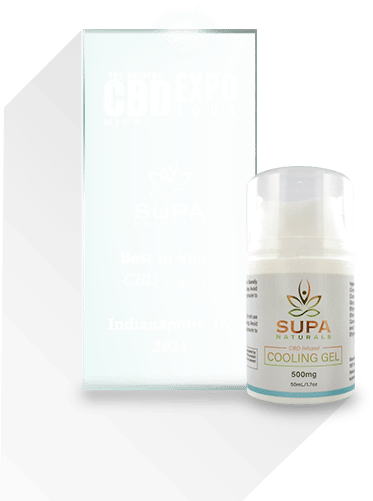Blog
- Filter by
- Categories
- Tags
- Authors
- Show all
June 22, 2022
Acne is a prevalent skin condition affecting up to 50 million Americans each year, including people of all ages. While many drugs and topicals exist across the market to treat acne, they vary in effectiveness and safety. Many people prefer natural acne treatments that minimize harsh side effects.
CBD oil has recently gained attention as a potential natural treatment for acne. Specifically, this cannabinoid may impact the body's sebum production, an essential component in acne development. CBD may also have anti-inflammatory effects that could reduce pimple development and severity.
Read on to learn more about the benefits of CBD for acne treatment.
Is CBD Effective For Acne?
Acne is a common skin condition occurring when the hair follicles beneath the skin become blocked with bacteria, dead skin, or oils. Many factors influence the development of this condition, such as:- Hormonal imbalances
- Excess sebum production
- Your skin care regimen
- Bacterial infections
- Clogged pores
- Friction or pressure on the skin
- Age
- Genetics
What Type Of Acne Does CBD Treat?
Understanding the type of acne you experience and the cause of your acne can help you determine whether CBD oil could be an effective anti-acne treatment. Because CBD can reduce the production of sebum in the skin, this treatment may be effective for types of acne caused by sebum overproduction. Acne vulgaris is a common skin condition produced when the sebaceous glands become clogged. This form of acne may increase in frequency with elevated sebum excretion. As a result, using CBD to limit sebum oil production in the skin may prevent acne vulgaris development. Hormonal acne is another common form of acne. This type of acne develops when hormonal changes in the body increase your skin's sebum and oil production. The excess oil interacts with your skin's pores and hair follicles, leading pimples to develop. However, taking CBD oil may inhibit sebum development, preventing this effect of hormonal imbalances. Notably, CBD most likely does not impact your hormones. If your acne develops primarily due to hormonal changes, you may find more success treating this condition at the source by taking measures to balance hormone production. However, CBD oil could be an effective adjunct treatment for hormonal acne. CBD oil also has therapeutic potential to fight inflammatory skin diseases, including inflammatory acne. One common type of inflammatory acne is cystic acne. Because CBD has anti-inflammatory properties, it may help prevent or reduce the appearance of inflammatory acne.Do you like it?
June 22, 2022
Over 39 million Americans struggle with migraines, and many of them have yet to find a successful treatment to alleviate their pain. Recently, CBD has entered the scene as a possible treatment for migraine sufferers. CBD may relieve neurological pain and reduce inflammation, both of which could aid pain associated with a migraine.
Understanding the research behind CBD and migraines and how CBD alleviates pain can help you know whether this treatment is suitable for your migraine pain. Read on to learn the current research into migraines and CBD and which CBD oil products work best for migraine treatment.
How Does CBD Work With Migraines And Headaches
Cannabidiol (CBD) acts on various bodily processes that contribute to pain, inflammation, and other symptoms of migraines. This substance has the most significant effect on your endocannabinoid system (ECS). This biological system impacts your central nervous system, pain control, inflammatory and immune responses, and numerous other bodily functions. The ECS consists of two primary cannabinoid receptors: CB-1 receptors and CB-2 receptors. When the ECS senses cannabinoids in the body, their molecules can bind to these receptors to produce varying biological effects. Some of these effects may act as an effective treatment for migraine systems.CBD and Pain Relief
First, CBD may produce pain-relieving effects by inhibiting the anandamide deactivation processes, thereby enhancing anandamide signaling. Anandamide is an endogenous cannabinoid that nullifies pain by binding to CB-1 and blocking the pain signal. As a result, taking CBD may stop the pain signals from migraines and headaches, helping you experience less pain. Cannabidiol may also relieve pain by activating the 5-HT1A serotonin receptor. This receptor plays a role in various biological functions, including pain perception.CBD and Anti-Inflammation
In many migraine sufferers, inflammation plays a significant role in the development of migraines. Some research suggests that inflammatory signals may stimulate neurons and create pain with migraines. As a result, lowering inflammation in the body could provide migraine relief. CBD oil may promote anti-inflammatory properties. CBD can bind with the CB-2 receptor, the primary mediator involved in cannabinoid regulation of inflammation.Do you like it?
June 9, 2022
Many people who struggle with anxiety on airplanes have turned to CBD to maintain their calmness during travels. Some studies show that CBD oil even helps with various health conditions. Therefore, it’s no surprise that you might want to take your CBD product wherever you go. This brings us to the question, “can you take CBD oil on a plane?”
Some countries, including the United States, have loosened regulations around CBD over the past few years. However, you might still be unsure about the legal consequences of traveling with CBD oil, and rightly so. Many countries still have harsh laws against CBD products because their laws recognize no difference between CBD products with low THC content and marijuana.
If you can’t always leave your CBD oil at home, it is essential that you know situations where it is allowed. Continue reading as we discuss the legalities of CBD products on international and domestic flights.
Is CBD Oil Legal on Domestic Flights?
For many years, the Transportation Security Administration (TSA) banned traveling with all forms of cannabis. However, this is no longer the case, as updated policies have made everything much different. Can you take CBD oil on a plane? In short, yes. These days you can safely travel with CBD oil in the United States without any legal consequence. Passengers can transport CBD products derived from hemp across state borders as the 2018 Farm Bill recognizes it as a legal substance. This means that you can travel between states with CBD oil without encountering problems with federal or state law. It is, however, worth noting that other types of CBD derived from marijuana remain illegal under federal laws. Here at SUPA Naturals, we provide high-quality CBD oil products that are within the regulations drawn out by the TSA and FDA. We use the CO2 extraction method to ensure that all our products offer only the beneficial attributes of the cannabis plant.Do you like it?
June 2, 2022
Dealing with menstrual cramps is a monthly frustration for billions of people. Taking CBD for menstrual cramps can provide you with a natural form of relief […]
Do you like it?
June 1, 2022
As increasing numbers of studies reveal the benefits of CBD, interest in its use has grown. While using CBD oil for sex is a creative concept, […]
Do you like it?
May 13, 2022
When cats get sick, their owners take them to the vet or give them medicine. With medicine expanding its horizons, people are turning to more natural […]
Do you like it?
April 25, 2022
CBD (cannabidiol) oil has experienced a surge in popularity in recent years as people take advantage of this product to improve their overall quality of life. However, not every CBD product provides you with the same benefits because these products can vary in quality.
Our team at SUPA Naturals can help you learn how to check CBD oil quality to make sure you get the best possible product. In addition, you can reach out to us online to learn more about CBD oil and its beneficial uses in your life. We can answer your questions.
#1: Go Over The Extraction Process
Companies use different solvents during the extraction of CBD oil. If you’re looking for high-quality CBD oil, choose a company that uses CO2 extraction techniques. You may also buy from a company that uses ethanol, as these options help mitigate solvent toxicity. On the other hand, make sure you avoid oils extracted with:- Propane
- Butane
- Pentane
- Hexane
#2: Check the Oil’s Ingredients
When looking for the right CBD oil, we recommend checking the ingredient list of every product you consider. You should find CBD extract and carrier oil on the list. Most CBD oil does not require preservatives, so it may be a sign to look at another option if you notice these. Avoid CBD oils with many chemical-sounding ingredients and focus on the carrier oil the company selected. We recommend natural oils like hemp seed oil or MCT oil (from coconuts). These safe and natural carrier oils tend to result in high-quality CBD products. Generally, the experts recommend avoiding CBD products with different carrier oils, like propylene glycol. You can find this ingredient in many vape juices, but it has potential health effects when consumed orally.#3: Go Over Labs Test Results
Before you buy a CBD product, we recommend looking at the lab results associated with the oil. Almost all tinctures and other CBD products go through some kind of testing, so if you find an oil with no results available, you may want to avoid it for safety. Some companies use in-house labs for testing. However, these labs may not provide unbiased results. Therefore, we recommend you look for products that went through third-party lab testing or tests conducted by a lab not associated with the manufacturer. Lab reports may provide you with information regarding:- Cannabinoid concentration in the oil
- The presence of contaminants (including heavy metals or mycotoxins)
- Terpenes contained in the oil
Do you like it?
April 6, 2022
CBD for athletes has a long-standing reputation for being a controversial topic. However, over the last few decades, more and more professional athletes are endorsing CBD, […]
Do you like it?
March 16, 2022
CBD Coffee Oil One of the greatest developments in the alternative health scene in the past decade has been the advent of CBD. This natural supplement […]
Do you like it?











